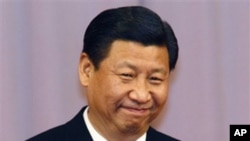China signaled a new era in leadership this week when it announced that Vice President Xi Jinping has been appointed to the Central Military Commission, which controls the country's two-million-strong army. Xi is taking the post President Hu Jintao held before he became China's leader. Observers say the announcement made after the Communist Party's annual meeting signals that Xi is being groomed to replace Mr. Hu when he resigns as party chief in 2012, and president in 2013.
VOA spoke with Zheng Wang, a senior fellow at the United States Institute of Peace and professor at New Jersey's Seton Hall University, about the continuing elevation of Xi Jinping.
Could you describe Mr. Xi's background?
His father was China's vice premier and also the head of the propaganda department in the 1950's and early 1960's, but later on was sent to prison during the Cultural Revolution. So actually, Xi Jinping has had a very unusual experience in the 1960's, especially during the Cultural Revolution. And he was sent to the countryside, joining the millions of radicals. He went to the countryside for the reeducation as a result of Chairman Mao's Down to the Countryside Movement. And he stayed in the countryside from 1969 until 1975, before he went to Tsinghua University.
So, many China observers believe that his early experience in China's countryside helped him to know China's grassroots, and his family experience, his personal experience as a victim of the Cultural Revolution, and some people believe he should understand better than many people about the importance of individual freedom and social justice.
Why is his appointment to the military commission significant?
First, the military commission is the party's actual power center. So, the former leaders Deng Xiaoping and Jiang Zemin, they both acted as the chairman of this commission even when they were no longer the state leader or the party leader, but they were the actual leader of China. And I think this appointment signified that Xi has formally become China's leader in waiting.
The leadership selection process in China is basically still a black book operation. So I think nobody can really talk about why somebody has been chosen. But I think that there's a couple of reasons Xi became this person. First reason: I think we have to go back to his family, and his family influence. You know, after the Cultural Revolution, his father came back to the political center and also even after he retired, he still remained as a very influential political elder in the party, and Xi started his political career at this time after his father came back. So, Xi Jinping received a quick promotion and emerged in the party quickly.
I think he's young, he's stable and he's always being careful not to touch any controversy issue and always try to avoid to reveal his real political will. And it also may be because he's not really has a strong personal color, or keeping a low profile, is somehow very important in China's power leadership.
His wife is a well known singer in China. Tell us about her.
Yeah, it's very interesting, actually. His wife, Peng Liyuan, is actually one of the most famous popular singers in China. So very often, he was kind of referred to as the husband of his wife, and the son of his father, rather than as himself. And his wife is very popular in China and very famous, and also for that reason, people think that maybe his wife will give influence on him and help him to know more about especially culture, about the popular life in China.




